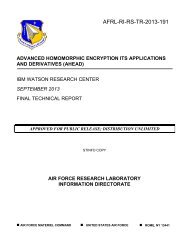EN100-web
EN100-web
EN100-web
You also want an ePaper? Increase the reach of your titles
YUMPU automatically turns print PDFs into web optimized ePapers that Google loves.
Special theme: Scientific Data Sharing and Re-use<br />
how, and with whom. Open data is<br />
sometimes viewed simply as releasing<br />
data without payment of fees. In<br />
research contexts, open data may pose<br />
complex issues of licensing, ownership,<br />
responsibility, standards, interoperability,<br />
and legal harmonization. To<br />
scholars, data can be assets, liabilities,<br />
or both. Data have utilitarian value as<br />
evidence, but they also serve social and<br />
symbolic purposes for control, barter,<br />
credit, and prestige. Incentives for scientific<br />
advancement often run counter<br />
to those for sharing data.<br />
To librarians and archivists, data are<br />
scholarly products to curate for future<br />
users. However, data are more difficult<br />
to manage than publications and most<br />
other kinds of evidence. Rarely are data<br />
self-describing, and rarely can they be<br />
interpreted outside their original context<br />
without extensive documentation.<br />
Interpreting scientific data often<br />
requires access to papers, protocols,<br />
analytical tools, instruments, software,<br />
workflows, and other components of<br />
research practice – and access to the<br />
people with whom those data originated.<br />
Sharing data may have little practical<br />
benefit if the associated hardware,<br />
software, protocols, and other technologies<br />
are proprietary, unavailable, or<br />
obsolete and if the people associated<br />
with the origins of the data cannot be<br />
consulted [2, 3].<br />
Claims that data and publications<br />
deserve equal status in scholarly communication<br />
for the purposes of citation<br />
raise a host of theoretical, methodological,<br />
and practical problems for bibliometrics.<br />
For example, what unit should<br />
be cited, how, when, and why? As<br />
argued in depth elsewhere, data are not<br />
publications [1]. The “data publication”<br />
metaphor, commonly used in promoting<br />
open access to data and encouraging<br />
data citation, similarly muddies the<br />
waters. Transferring bibliographic citation<br />
principles to data must be done<br />
carefully and selectively, lest the problems<br />
associated with citation practice be<br />
exacerbated and new ones introduced.<br />
Determining how to cite data is a nontrivial<br />
matter.<br />
Rather than assume that data sharing is<br />
almost always a “good thing” and that<br />
doing so will promote the progress of<br />
science, more critical questions should<br />
be asked: What are the data? What is the<br />
utility of sharing or releasing data, and<br />
to whom? Who invests the resources in<br />
releasing those data and in making them<br />
useful to others? When, how, why, and<br />
how often are those data reused? Who<br />
benefits from what kinds of data<br />
transfer, when, and how? What<br />
resources must potential re-users invest<br />
in discovering, interpreting, processing,<br />
and analyzing data to make them<br />
reusable? Which data are most important<br />
to release, when, by what criteria,<br />
to whom, and why? What investments<br />
must be made in knowledge infrastructures,<br />
including people, institutions,<br />
technologies, and repositories, to sustain<br />
access to data that are released?<br />
Who will make those investments, and<br />
for whose benefit?<br />
Only when these questions are<br />
addressed by scientists, scholars, data<br />
professionals, librarians, archivists,<br />
funding agencies, repositories, publishers,<br />
policy makers, and other stakeholders<br />
in research will satisfactory<br />
answers arise to the problems of data<br />
sharing [1].<br />
References:<br />
[1] C.L. Borgman: "Big Data, Little<br />
Data, No Data: Scholarship in the<br />
Networked World". MIT Press, 2015.<br />
[2] C.L. Borgman et al.: "The Ups and<br />
Downs of Knowledge Infrastructures<br />
in Science: Implications for Data<br />
Management", ACM/IEEE Joint<br />
Conference on Digital Libraries (JCDL<br />
2014) and International Conference on<br />
Theory and Practice in Digital<br />
Libraries (TPDL 2014) (London,<br />
2014), 2014.<br />
[3] J.C. Wallis et al.: "If we share data,<br />
will anyone use them? Data sharing<br />
and reuse in the long tail of science<br />
and technology", PLoS ONE. 8, 7 (Jul.<br />
2013), e67332.<br />
Please contact:<br />
Christine L. Borgman<br />
University of California, Los Angeles,<br />
USA<br />
E-mail: Christine.Borgman@ucla.edu<br />
Enhancing the value of Research Data<br />
in Australia<br />
by Andrew Treloar, Ross Wilkinson, and the ANDS team<br />
Over the last seven years, Australia has had a strong investment in research infrastructure,<br />
and data infrastructure is a core part of that investment.<br />
Much has been achieved already. The<br />
Government understands the importance<br />
of data, our research institutions<br />
are putting in place research data infrastructure,<br />
we can store data, we can<br />
compute over data, and our data providing<br />
partners – research institutions,<br />
public providers, and NCRIS data intensive<br />
investments are ensuring that we<br />
are establishing world best data and<br />
data infrastructure.<br />
The Australian National Data Service<br />
(ANDS) commenced in 2009 to establish<br />
an Australian research data commons.<br />
It has progressively refined its<br />
mission towards making data more<br />
valuable to researchers, research institutions<br />
and the nation. Over the last 5<br />
years ANDS has worked across the<br />
whole sector in partnership with major<br />
research organisations and NCRIS<br />
facilities. It has worked collaboratively<br />
to make data more valuable through<br />
bringing about some critical data transformations:<br />
moving to structured data<br />
collections that are managed, connected,<br />
discoverable and reusable. This<br />
requires both technical infrastructure<br />
and community capability, and can<br />
deliver significant research changes [1].<br />
We have seen many examples where<br />
these transformations have been suc-<br />
16<br />
ERCIM NEWS 100 January 2015



